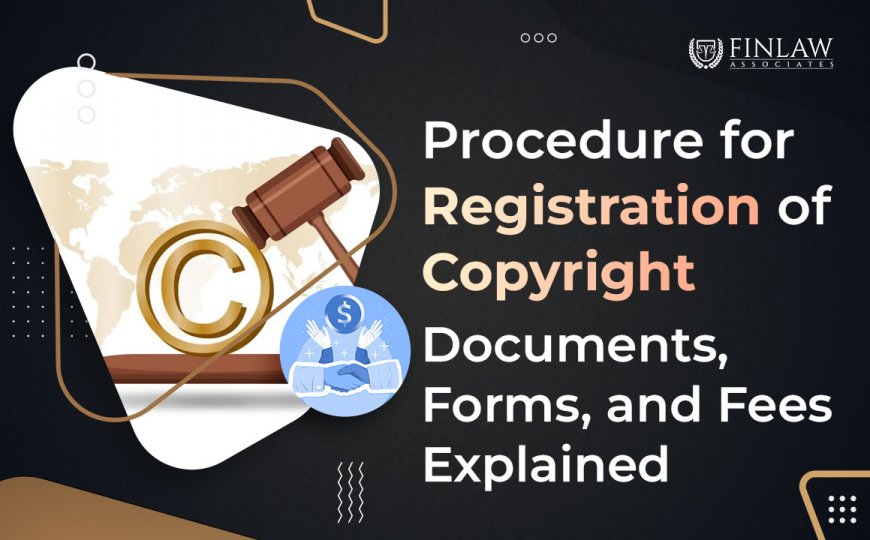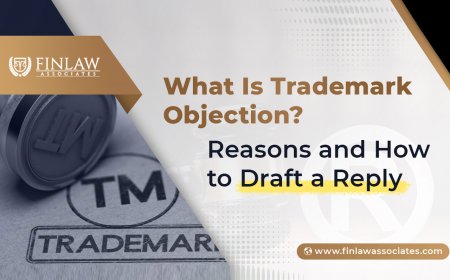Procedure for Registration of Copyright in India: Documents, Forms, and Fees Explained
Step-by-step procedure for registration of copyright in India. Learn documents, forms, fees, timeline, and FAQs to protect your creative works.

Copyright protects original works of authorship and gives creators exclusive rights to reproduce, distribute, and commercialize their creations. In India, copyright is governed by the Copyright Act, 1957, and the Copyright Rules, 2013.
While copyright comes into existence automatically when a work is created, registration provides solid legal proof of ownership and simplifies enforcement in cases of infringement. If you’re a writer, musician, artist, filmmaker, or software developer, understanding the procedure for registration of copyright is essential to safeguard your intellectual property.
This guide explains the step-by-step procedure, required documents, forms, fees, timelines, and common mistakes to avoid.
Why Is Copyright Registration Important in India?
Though copyright exists automatically, registration offers several benefits:
-
Legal Evidence of Ownership – The certificate is prima facie proof in courts.
-
Public Record – Registration creates an official record of your work.
-
Commercial Advantage – Helps in licensing, franchising, and assigning rights.
-
Prevents Misuse – Makes it easier to stop unauthorized use or duplication.
-
Strengthens Enforcement – Registration is necessary in many cases for initiating infringement lawsuits.
In a digital-first world where plagiarism, piracy, and misuse are rampant, registering copyright is a vital step for creators and businesses.
Categories of Works That Can Be Registered
The Copyright Office allows registration of the following categories of works:
-
Literary Works – Novels, poems, articles, blogs, software source code, training materials.
-
Dramatic Works – Screenplays, plays, scripts, choreographic works.
-
Musical Works – Music notations, compositions, with or without lyrics.
-
Artistic Works – Paintings, drawings, graphics, photographs, architectural designs, logos.
-
Cinematograph Films – Full-length movies, short films, documentaries, OTT content.
-
Sound Recordings – Music albums, podcasts, background scores, audiobooks.
Note: Software is classified as a literary work, but requires submission of source code extracts.
Step-by-Step Procedure for Registration of Copyright in India
Here is the complete procedure for registration of copyright in India:
Step 1: Prepare the Work and Documents
-
Identify the type of work.
-
Collect digital and hard copies.
-
Gather details of the author, publisher, and year of publication.
Step 2: Create Account on the Copyright Portal
-
Visit the official Copyright Office Website.
-
Create a login ID for e-filing.
Step 3: Fill Out Form XIV
The main form for copyright registration is Form XIV. It requires details like:
-
Title, language, and type of work.
-
Author and applicant information.
-
Date of creation/publication.
-
Ownership status (author, assignee, or publisher).
Step 4: Upload Supporting Documents
Upload scanned copies of:
-
The work (usually two copies).
-
Applicant/author’s ID proof (Aadhaar, PAN, Passport).
-
No Objection Certificate (if the applicant is not the author).
-
Power of Attorney (if filed by an agent).
-
Statement of Particulars and Statement of Further Particulars.
Step 5: Pay the Fee Online
Fees vary depending on the type of work and whether the applicant is an individual or a company.
Step 6: Receive Diary Number
Once submitted, you’ll receive an acknowledgement (Diary Number).
Step 7: Scrutiny & Waiting Period
-
A mandatory 30-day waiting period follows for objections.
-
If no objection is raised, the Registrar examines the application.
-
If an objection is raised, hearings are scheduled.
Step 8: Grant of Registration
-
If approved, the Registrar records the work in the Register of Copyrights.
-
A Registration Certificate is issued.
Documents Required for Copyright Registration
Here’s a detailed checklist of documents you may need:
-
Duly filled Form XIV.
-
Two copies of the work.
-
Proof of identity (Aadhaar, Passport, PAN).
-
Proof of ownership (NOC, assignment deed, publishing agreement).
-
Power of Attorney (if filing through an agent).
-
For software: first & last 10 pages of source code.
-
For artistic works: sample copies or soft images.
-
For music: notations or lyrics.
Copyright Registration Forms
-
Form XIV – Main application form for copyright registration.
-
Statement of Particulars & Further Particulars – Additional declarations.
-
Power of Attorney (POA) – If an agent or lawyer is filing.
Copyright Registration Fees in India
Here’s a simplified fee table (subject to government updates):
|
Type of Work |
Fee (Individual) |
Fee (Others/Companies) |
|
Literary, Dramatic, Musical Work |
₹500 |
₹2,000 |
|
Artistic Work (e.g., Logo, Design) |
₹500 |
₹2,000 |
|
Cinematograph Film |
₹5,000 |
₹5,000 |
|
Sound Recording |
₹2,000 |
₹2,000 |
|
Software (as literary work) |
₹500 |
₹2,000 |
Always verify the latest fee schedule on the Copyright Office portal before payment.
Timeline for Copyright Registration
The timeline may vary, but typically:
-
Acknowledgement (Diary Number): Immediately after filing.
-
Objection Period: 30 days.
-
Examination and Scrutiny: 1–3 months.
-
Final Certificate: Usually 2–8 months, depending on objections and backlog.
Common Mistakes to Avoid
-
Submitting incomplete forms.
-
Forgetting NOC/assignment documents.
-
Uploading incorrect file formats.
-
Using mismatched details for author and applicant.
-
Not sending physical copies if requested.
How to Handle Objections
If an objection is raised during the process:
-
You’ll receive a notice from the Registrar.
-
Both parties must submit written responses.
-
Hearings may be scheduled.
-
If resolved, registration is granted; if not, the application may be rejected.
FAQs on Copyright Registration in India
1. How long does copyright last in India?
-
Literary, artistic, musical, and dramatic works: Lifetime of the author + 60 years.
-
Cinematograph films and sound recordings: 60 years from publication.
2. Can software be copyrighted?
Yes, software is treated as a literary work under the Copyright Act.
3. Is online filing enough?
Yes, but you may be required to send hard copies of documents to the Copyright Office.
4. Can multiple authors apply together?
Yes, co-authors can jointly file, provided proper NOCs are attached.
5. Is copyright registration mandatory in India?
No, but it is highly recommended for legal enforcement and commercial use.
Final Checklist Before Filing
-
Identify the work type.
-
Collect all supporting documents.
-
Fill Form XIV carefully.
-
Pay the correct fee online.
-
Track your application using the Diary Number.
Conclusion
The procedure for registration of copyright in India may seem detailed, but with the right preparation, it is straightforward. Registration not only provides proof of ownership but also strengthens your ability to enforce rights against infringers.
For creators, startups, businesses, and artists in India, copyright registration is an investment in protecting intellectual property and ensuring long-term benefits from original works.
What's Your Reaction?















